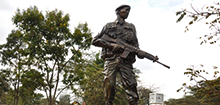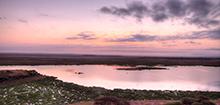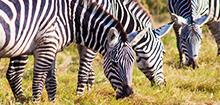The Cabinet Secretary for Tourism and Wildlife, Hon. Najib Balala, has called on the public servants to adopt rules and systems as way of curbing corruption in the wildlife sector.
Speaking during the official launch of the Kenya Wildlife Service Corruption Perception and Experience Survey Report at the iconic Ivory Burning Site in Nairobi National Park, to mark the 16th International Anti-Corruption Day, Hon Balala recommended robust anti-corruption engagements supported by various stakeholders.
He noted that the Ministry of Tourism and Wildlife recognizes that the fight against corruption needs to be strengthened to boost the tourism industry.
This concern prompted KWS to conduct a survey on the perceptions and experiences of corruption by KWS staff in the course of duty as well as
For the last couple of years, KWS in partnership with United Nations Office on Drugs and Crime (UNODC), have been in the forefront of adopting counter mechanisms in the fight against corruption in the wildlife sector.
KWS marked this year’s International Anti-Corruption Day with the launch of Corruption Prevention and Experience Survey results, dissemination of the KWS Code of Conduct and KWS Corruption Prevention Policy.
The survey involved more than 2000 respondents within the organization, with more than 50 per cent expressing strong belief in the fight against corruption by the institution. They indicated that management is a key determinant of corruption trends in KWS.
KWS Director General, Brig (Rtd) John Waweru, assured the public that KWS will keep corruption prevention within the wildlife sector high on its agenda and shall spearhead efforts towards attaining the ultimate goal of "zero corruption" within the service.
US Deputy Assistant Secretary Bureau of International Narcotics and Law Enforcement Affairs (INL), Ms. Heather Merritt, noted with appreciation the speed at which KWS is moving in implementing key policies set to quash the corruption menace affecting the service.
“I am happy to be in Kenya today, which is a strong partner in our fight against transnational crime and corruption as President Kenyatta himself has publicly denounced acts of corruption and called for utmost condemnation of corrupt deeds.
She noted that the work Kenya Wildlife Service and UNODC are doing together is another example of Kenya’s dedication to combating corruption. “The leadership at KWS recognizes the risks associated with corruption and is working to safeguard its organization from corruptive influences through the establishment of the Code of Conduct and Corruption Prevention Policy.”
“Wildlife trafficking pushes protected species to the brink of extinction, impedes legitimate economic growth and development, threatens security and stability, undermines the rule of law and increases the risks of disease,” she added.
Ms Merritt said that corruption was the critical link that enables wildlife trafficking and organised crime to flourish. Corruption occurs on all levels, from failures at low level enforcement to high level government officials.”
Head of Rural Development, Agriculture and Food Security, European Union to Kenya, Ms. Myra Bernardi, said the European Union appreciates and supports Kenya’s leadership in the global fight to end poaching and trafficking of protected species.
Ms Bernardi announced that the European Union was investing Euro 30 million in cross-regional wildlife programme where the Jomo Kenyatta International Airport, Mombasa port, and trans-boundary areas are benefiting.
“African has been identified as our most natural partner full of opportunities for cooperation, including in the fight against trafficking of wildlife and forest products. A Comprehensive Strategy for Africa will be developed and our task is to ensure that it reflects the priorities of the European Union Green Deal,” she said.
She noted that KWS was benefiting from training and is in turn training its colleagues from East African countries, citing recent KWS provision of First Responders training for Uganda Wildlife Authority officials in Kisumu.
KWS Chairman Board of Trustees, Dr. John Waithaka, described corruption as a sin and called for transparency in tendering, finance, infrastructure and human capital processes.
He said the KWS Board and Management are committed to ensuring that all KWS activities are conducted in an honest and ethical manner. “Neither KWS, nor any entity associated or working with the Service, will facilitate corrupt activities, which may include but not limited to: undue payments, offer, promise, authorize or receive any bribe, gift, favor, or other illicit inducement payments or benefits in violation of laws and regulations,” he said.
Dr Waithaka noted that the prevention, detection and reporting of corruption is the responsibility of everyone, including all stakeholders working with or for KWS and that the code of conduct is aligned to the Constitutional requirements on integrity in public service.





